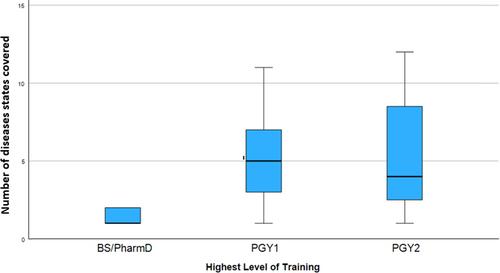Pharmacist certification of drug therapy modification: A survey of pharmacist-reported practices, facilitators, and barriers in Georgia
Abstract
Introduction
Collaborative drug therapy management (CDTM) allows pharmacists to assess patients, administer medications, manage and adjust medication regimens, and order laboratory tests within a defined protocol. Pharmacist CDTM may aid in preventative care and chronic condition management.
Objectives
The primary objectives were to identify CDTM services provided by pharmacists in the state of Georgia, examine factors associated with the provision of CDTM services, and identify barriers and facilitators to CDTM service provision. The secondary objective was to assess differences in CDTM practice between pharmacists who completed a Registered Pharmacist (R.Ph.)/Doctor of Pharmacy (Pharm.D.), postgraduate year one (PGY1), or postgraduate year two (PGY2) residency.
Methods
Using the Dilman method, this cross-sectional study invited all 134 CDTM-licensed pharmacists in Georgia to complete a 30-min electronic survey. Data included demographics, training, services offered, disease states managed, and perceptions regarding CDTM implementation. Descriptive statistics, Welchs analysis of variance (ANOVA), and chi-square were conducted using SPSS v28.
Results
A total of 36 (26.9%) pharmacists completed the survey. Participants offered a median of three CDTM services. A majority offered medication therapy management (86.1%) and chronic care management (66.7%). A majority offered services for diabetes (58.3%), hyperlipidemia (55.6%), and hypertension (55.6%). There were differences in the mean ranked number of CDTM services offered between R.Ph./Pharm.D. and PGY2 groups (−11.667, p = 0.019), and the mean ranked number of disease states covered between R.Ph./Pharm.D. and PGY1 (−10.990, p = 0.029) and R.Ph./Pharm.D. and PGY2 (−12.640, p = 0.010, adjusted p-value) groups. Reported CDTM facilitators were job requirements, expanding patient care, job satisfaction/personal advancement, and expanding professional practice. Reported challenges were continuing education, clinical/interprofessional concerns, administration issues with the board of pharmacy or individual practice site, and regulations differing from other states.
Conclusion
Of those with CDTM licensure, a majority offer medication therapy management and chronic care management services covering diabetes, hypertension, and hyperlipidemia. Postgraduate training may help prepare pharmacists to engage in CDTM services.



 求助内容:
求助内容: 应助结果提醒方式:
应助结果提醒方式:


